So you’re in the market for a new pair of dumbbells. But what dumbbell weight should you get?! If this is a question you need answering, then look no further. Because today, I’ll be explaining what kg dumbbells you should be buying in order to build muscle.
15-25kg dumbbells are good for beginners to start with. This is enough weight to build some muscle, lose fat, and get toned. People who are looking to build more muscle will generally need heavier dumbbells that weigh at least 30kg.
I’m also currently in the market for a pair of adjustable dumbbells. Lucky for me, I have 10 years of weight training experience to help me choose the perfect dumbbell kg.
But I know you may not have the same luxury.
This is why I want to share my research and experience with you today.
So let’s get started!

Key Takeaway:
- Skinny guys weighing around 65kg with little training history should choose 25 to 35kg dumbbells.
- Average guys weighing around 80kg with some training history should choose 35 to 45kg dumbbells.
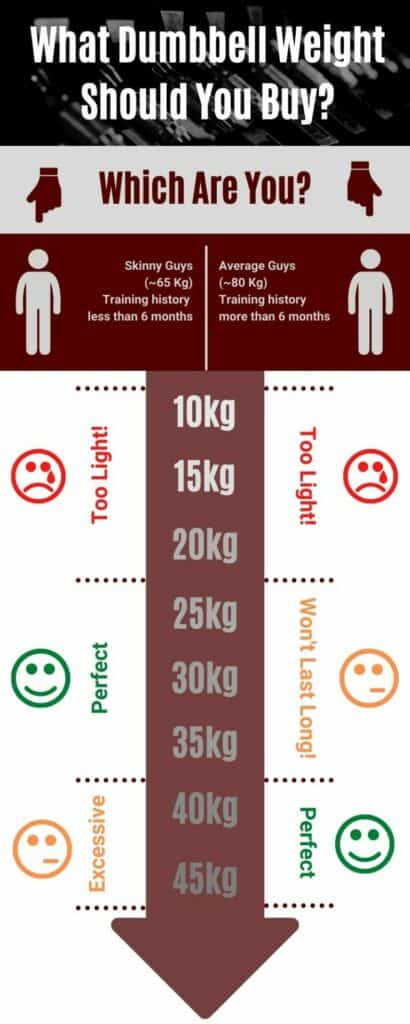
Dumbbells Recommended In This Post
| Dumbbell | Brand | Description | Prime | Buy |
|---|---|---|---|---|
 Top
Top Top
Top | Yes4All | 10 to 20kg budget adjustable spinlock dumbbells | PrimeEligible | Check Amazon Price |
 Top
Top Top
Top | Bowflex | 25kg midrange adjustable selectorized dumbbells | PrimeEligible | Check Amazon Price |
Top Top
Top Top
Top | PowerBlock | 25kg midrange adjustable selectorized dumbbells that can be upgraded to 30 to 35kg (requires stage 2 addon kit) | PrimeEligible | Check Amazon Price |
 Top
Top Top
Top | Bowflex | 40 to 45kg premium adjustable selectorized dumbbells | PrimeEligible | Check Amazon Price |
What Kg Dumbbells Should You Use?
It’s basically impossible to choose one dumbbell weight to fit everyone’s needs.
Where one person may have no issue bench pressing a pair of 10kg dumbbells, another may struggle.
That’s because your current strength level determines how heavy you can lift, and this, in turn, influences your ideal dumbbell weight.
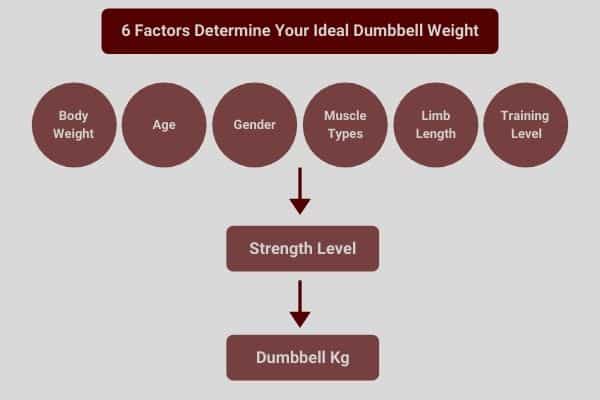
Strength level is influenced by:
- Training level- the longer you’ve been training, the heavier the dumbbells you can lift.
- Gender- men can usually lift more weight than women due to having more muscle mass.
- Bodyweight- the heavier you are, the heavier the dumbbells you’ll need.
- Age- if you’re in physical maturity (20-30 years old), you’ll be able to lift heavier dumbbells.
- Limb length- if you have shorter limbs, you can often lift heavier dumbbells (and vice versa).
- Muscle types- the more fast-twitch muscle fibres you have, the heavier the dumbbells you can lift.
Therefore you should choose a dumbbell weight that is tailored to your current and future needs (more on this next).
The ideal dumbbell kg will:
- Fulfill your immediate needs- choose a dumbbell that satisfies your current strength level.
- Allow room for future progression- choose a dumbbell that accommodates long-term strength development.
- Be cost-effective- choose the cheapest dumbbell that meets the two criteria above.
Next, I’ll explain how to calculate the right dumbbell kg for YOUR personal needs.
The 4-Step Process To Choosing The Right Dumbbell.
Here’s my 4-step process to help you choose the right kg dumbbell for your personal needs.
By following this method, you’ll be able to choose a pair of dumbbells that will allow you to continue building muscle for years to come.
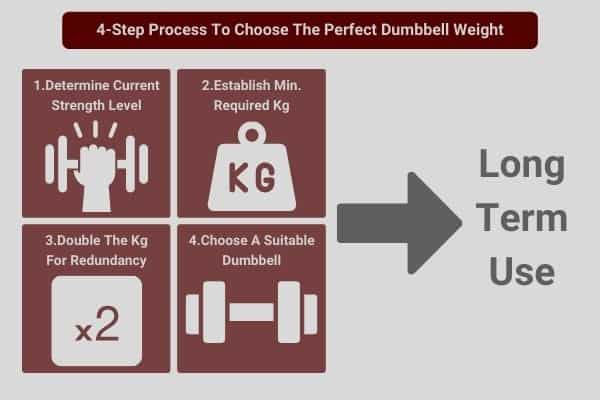
1) Determine Your Current Strength Level.
The ideal dumbbell kg for building muscle will allow you to lift your 8 to 15-rep max. What does this mean?
An 8-rep max is a weight that allows you to complete 8 continuous repetitions for a specified exercise. Similarly, a 15-rep max is a weight that allows you to lift 15 continuous repetitions. The 8 to 15-rep max is considered the ideal rep range for promoting muscle growth.
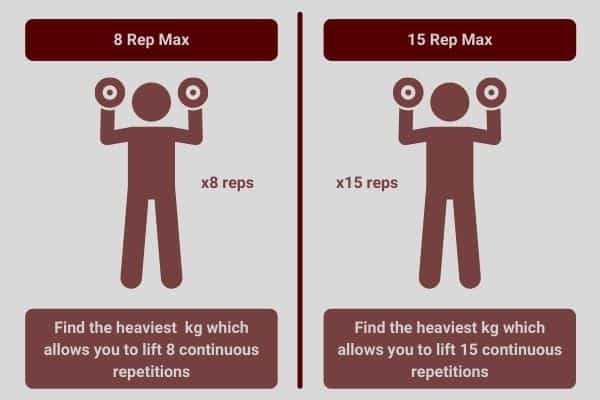
An 8 to 15-rep max varies according to your strength level and the exercises you’re performing.
For example- your 8-rep max for dumbbell curls will be significantly lower than your 8-rep max for a dumbbell deadlift.
That’s because the deadlift is a big movement that recruits lots of large muscles. In contrast, the bicep curl only activates your biceps.
Therefore you should choose a dumbbell weight that allows you to perform your 8 to 15-rep max for all intended exercises (check out my other post for my favorite dumbbells for arm workouts.)
For most beginners, a weight range between 2kg to 25kg per dumbbell will be suitable for this. In other words, buy dumbbells that offer 2 to 25kg of weight.
If you’re interested, you can also check out my other article to find out how heavy your dumbbells should be to build muscle.
2) Establish Your Minimum Required Kg.
The quickest and safest way to identify your 8-15-rep max (8-15RM) is to use the Strength Level database.
These guys have compiled millions of user-generated 1-rep max’s for all the dumbbell exercises you would perform.
A 1-rep max (1RM) is simply the heaviest amount of weight you can lift for 1 repetition.
To find your 1RM, simply locate your exercise, gender, training level, and body weight. The database will then give your estimated 1RM.
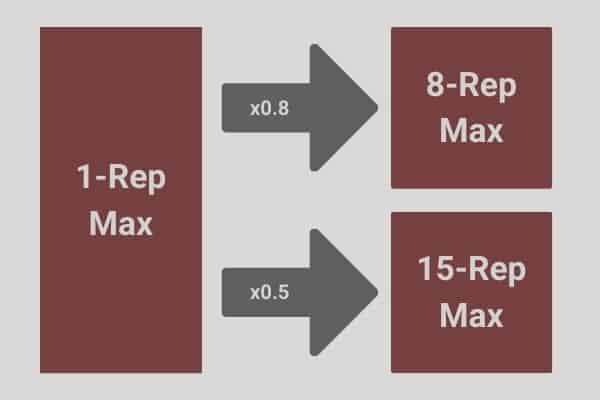
When you know your 1RM for an exercise, you can then calculate your 8RM and 15RM:
- 8RM = 1RM x 0.8.
- 15RM = 1RM x 0.5.
This is important because the 8RM and 15RM will give you an idea of how much weight you should be lifting to build muscle. And this helps you decide what kg dumbbell to buy.
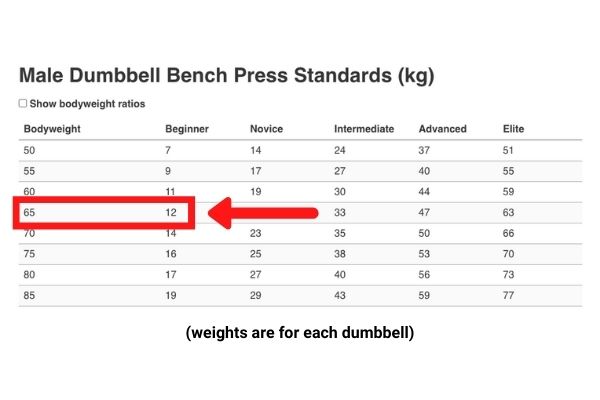
For example- a 65kg male beginner is expected to have a dumbbell bench press 1RM of 24kg. So his dumbbell bench press 8RM would be 19kg, and his 15RM would be 12kg.
Check out my other article to learn how to use dumbbells for a bigger chest!
You should calculate your 8RM and 15RM for each of the 5 core lifts:
- Bench press.
- Shoulder press.
- Row.
- Squat.
- Deadlift.
These 5 core lifts represent your heaviest lifting exercises, and they’re also the best muscle-building exercises you can perform with your dumbbells.
As an example, here are the estimated 1RMs, 8RMs, and 15RMs for the 5 core lifts as a 65kg male beginner:
| Dumbbell Exercise | Estimated 1RM | Estimated 8RM | Estimated 15RM |
|---|---|---|---|
| Bench Press | 24 kg | 19 kg | 12 kg |
| Shoulder Press | 20 kg | 16 kg | 10 kg |
| Row | 24 kg | 19 kg | 12 kg |
| Squat | 14 kg | 11 kg | 7 kg |
| Deadlift | 26 kg | 21 kg | 13 kg |
As you can see, a 65kg male beginner would need a minimum of 30kg (a pair of 15kg dumbbells) to get a good workout.
Now, you can calculate your own 8RMs and 15RMs!
For a detailed RM explanation, you may be interested in my other article which explains what a repetition maximum is.
3) Double The Kg For Redundancy.
So far, you’ve determined how much weight you should currently be lifting.
However, this is NOT the dumbbell weight you should be buying.
Rather, your ideal dumbbell weight should give you redundancy. In other words, it should be more than what you currently need.
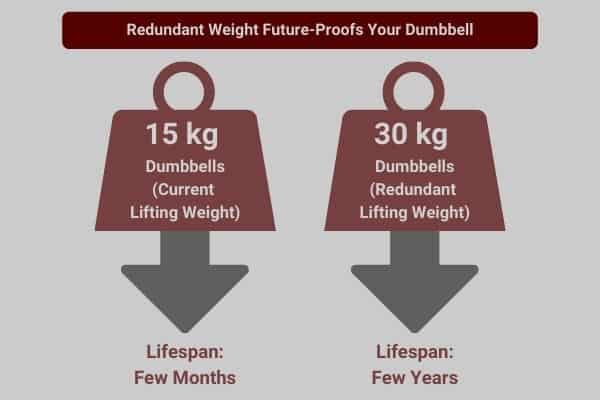
Dumbbell redundancy gives room for future progression and reduces the need for upgrading down the line.
This is particularly important if you’re a beginner (you can find my beginner dumbbell recommendations here) because you’ll get bigger and stronger very quickly (if you follow a good training program).
These are called newbie gains, and you should take advantage of them.
The last thing you want is to waste money upgrading to new dumbbells after a few months of training!
As a general rule, you should at least double your current dumbbell requirements. So if you currently require a pair of 15kg dumbbells, then buy a pair of 30kg dumbbells (or more)
Obviously the more redundancy, the less likely you’ll have to upgrade down the line.
You can check out my other article for more details on the ideal dumbbell kg/lb for beginners!
4) Choosing The Right Dumbbell Type.
So you’ve decided on your ideal dumbbell weight. But there are different kinds of dumbbells, the most popular being fixed-weight and adjustable.
So which type of dumbbell is best and which should you choose?
| Adjustable Dumbbell Pro’s | Adjustable Dumbbell Con’s | Fixed-Weight Dumbbell Pro’s | Fixed-Weight Dumbbell Con’s |
|---|---|---|---|
| Fast workouts | Awkward for beginners | Heavy weights | Expensive to buy a set |
| Space-saving | Moving parts | Durable | Space-consuming |
| Cost-effective | Limited weight | Easy to grip |
Adjustable dumbbells allow you to select different kg’s from the same dumbbell.
In comparison, fixed-weight dumbbells come as a standalone weight. And you’ll need a complete set to achieve the desired weight increments.
Adjustable dumbbells are the better choice for most people (especially beginners and intermediates).
For the price you pay, they’re convenient to use, take up little space, and will provide all the weight increments you need for years to come (as long as you choose a suitable weight).
In comparison, fixed-weight dumbbells can easily cost over £1000 and are mostly suitable for experienced lifters who need very heavy weights. They also take up a lot of space (a rack occupies around 24 square feet).
You can check out my other article for more details on the average price per pound of different types of weights.
Examining Dumbbells From 10Kg To 45Kg.
Now I’ll examine a range of popular dumbbell weights. This will help you validate whether you’ve chosen the right dumbbell for your needs.
For the purpose of this post, all dumbbells mentioned will be adjustable dumbbells (i.e. a 20 kg dumbbell will weigh 20kg including its individual increments).
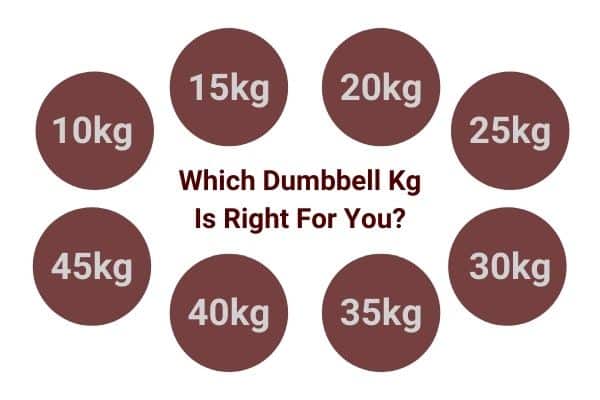
Here are the metrics I used to examine each dumbbell weight:
- Estimated longevity- how long the dumbbell should last you before needing to upgrade, based on how many months the dumbbell will be classified as “heavy” for the majority of your exercises.
- Estimated muscle gains- how much muscle you can expect to put on, based on my 10-year weight lifting experience with dumbbells.
- Perceived weight- how heavy each dumbbell feels for different exercises at different training levels.
Note on perceived dumbbell weight:
For each dumbbell weight, I’ve classified it as being heavy, moderate, or light for 10 of the most popular exercises at different levels of training.
Here’s how I defined the perceived weight:
- Heavy- above 75% of 1RM (allows you to perform an 8RM for the exercise).
- Moderate- 50-75% of 1RM (allows you to perform a 15RM for the exercise).
- Light- below 50% of 1RM (no good for building muscle).
These values were calculated from the Strength Level database.
When choosing a dumbbell weight, you’ll want to be in the heavy or moderate range for as long as possible!
You can check out my other article for dumbbell workout ideas!
10/15/20 Kg Dumbbells.
10kg/15kg/20kg dumbbells are the lightest adjustable dumbbells on the market. They’re also the cheapest, priced between £20.00 to £50.00 for a pair.
These dumbbells are often plate-adjustable, meaning the weight is changed by adding/removing weight plates. Furthermore, they are commonly made from plastic composite. However, good ones can be made from metal.
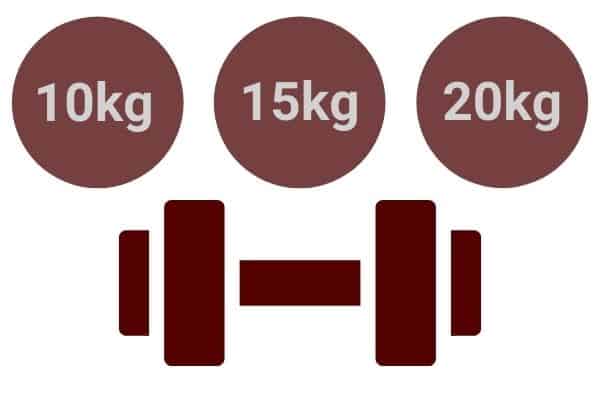
Will 10/15/20 Kg Dumbbells Be Enough To Build Muscle?
Cheap as they may be, here’s why 10/15/20 kg dumbbells are not ideal for building muscle.
10kg, 15kg, and 20kg dumbbells will build approximately 1 to 10 pounds of muscle for a 65kg male beginner. Furthermore, 10kg, 15kg, and 20kg dumbbells can be used for up to 2 to 6 months. A heavier dumbbell can be used for longer and will allow more muscle to be gained.
Here’s a breakdown of the estimated longevity and muscles gains from 10/15/20 kg dumbbells:
| Single Dumbbell Weight | Estimated Longevity | Estimated Muscle Gains |
|---|---|---|
| 10 kg | Up to 3 months | 1 to 3 pounds |
| 15 kg | Up to 4 months | Up to 5 pounds |
| 20 kg | Up to 6 months | Up to 10 pounds |
10 pounds of muscle gain will be noticeable on your body.
If you’re a skinny guy, you’ll become leaner and develop slightly more defined musculature.
However, it’s by no means enough to build a powerful-looking physique. And after half a year, you will likely have to upgrade to continue making muscle gains.
You can go to my other article for a complete skinny guy’s guide to gaining 10llbs of muscle!
Are 10/15/20 Kg Dumbbells Considered Heavy?
Depending on your current training level, the perceived weight for 10/15/20 kg dumbbells will vary.
10kg and 15kg dumbbells are considered to be heavy for 65kg male beginners who have been training for less than a month. In contrast, 20kg dumbbells are considered to be heavy for 65kg male novices who have been training for less than 6 months.
Here’s a breakdown of the perceived weight for 10/15/20 kg dumbbells relative to your training level:
| Dumbbell Exercise | 1 Month Training | 6+ Months Training | 24+ Months Training | 5 Years Training |
|---|---|---|---|---|
| Bench Press | Heavy | Moderate | Light | Light |
| Shoulder Press | Heavy | Moderate | Light | Light |
| Dumbbell Row | Heavy | Moderate | Light | Light |
| Front Squat | Heavy | Moderate | Light | Light |
| Deadlift | Heavy | Moderate | Light | Light |
| Bicep Curl | Heavy | Heavy | Moderate | Light |
| Tricep Extension | Heavy | Heavy | Moderate | Light |
| Dumbbell Fly | Heavy | Heavy | Moderate | Light |
| Reverse Fly | Heavy | Heavy | Moderate | Light |
| Lateral Raise | Heavy | Heavy | Heavy | Moderate |
A 65kg male will find a pair of 10kg dumbbells to be heavy during the initial month of training. He will be able to build around 3 pounds of muscle by performing the 5 core lifts and accessory exercises such as curls, flyes, and dumbbell raises.
However, after around 3 months, he’ll need to upgrade in order to stay challenged by the 5 core lifts.
| Dumbbell Exercise | 1 Month Training | 6+ Months Training | 24+ Months Training | 5 Years Training |
|---|---|---|---|---|
| Bench Press | Heavy | Moderate | Light | Light |
| Shoulder Press | Heavy | Heavy | Moderate | Light |
| Dumbbell Row | Heavy | Moderate | Light | Light |
| Front Squat | Heavy | Heavy | Moderate | Light |
| Deadlift | Heavy | Moderate | Light | Light |
| Bicep Curl | Heavy | Heavy | Heavy | Light |
| Tricep Extension | Heavy | Heavy | Heavy | Light |
| Dumbbell Fly | Heavy | Heavy | Heavy | Light |
| Reverse Fly | Heavy | Heavy | Heavy | Light |
| Lateral Raise | Heavy | Heavy | Heavy | Heavy |
A 65kg male will find a pair of 15kg dumbbells sufficient for approximately 4 months of training. And this will allow him to build around 5 pounds of muscle.
However, after 4 months of using 15kg dumbbells, the individual will likely have to upgrade in order to remain challenged in the 5 core lifts.
| Dumbbell Exercise | 1 Month Training | 6+ Months Training | 24+ Months Training | 5 Years Training |
|---|---|---|---|---|
| Bench Press | Heavy | Heavy | Moderate | Light |
| Shoulder Press | Heavy | Heavy | Heavy | Moderate |
| Dumbbell Row | Heavy | Heavy | Moderate | Light |
| Front Squat | Heavy | Heavy | Moderate | Light |
| Deadlift | Heavy | Heavy | Moderate | Light |
| Bicep Curl | Heavy | Heavy | Heavy | Moderate |
| Tricep Extension | Heavy | Heavy | Heavy | Moderate |
| Dumbbell Fly | Heavy | Heavy | Heavy | Moderate |
| Reverse Fly | Heavy | Heavy | Heavy | Moderate |
| Lateral Raise | Heavy | Heavy | Heavy | Heavy |
A 65kg male will find a pair of 20kg dumbbells sufficient for approximately 6 months of training. And this can help him build around 10 pounds of muscle.
However, he will probably need to upgrade the dumbbell weight after 6 months to remain challenged by the 5 core lifts.
You can go to my other article to find out what dumbbells are considered to be light, medium, and heavy.
Who Should Get 10/15/20 Kg Dumbbells?
10kg and 15kg dumbbells should generally be avoided if you’re a male since you’ll outgrow these dumbbells very quickly. You can find my recommended dumbbell choices for men here.
In comparison, 20kg dumbbells can be great if you’re looking to train casually and build a leaner, slightly more defined body.
However, if your goal is to build more than 10 pounds of muscle or you plan to train long-term, you’ll want to go for something heavier.
- SINGLE DUMBBELL 52.5 LBS TOTAL: ONE 16”x1.15” handle, EIGHT 5-pound plates, TWO 2.5-pound plates, TWO 1.25-pound plates, TWO collars
- CAST IRON WEIGHT PLATES FIT 1.15-INCH STANDARD BAR: Accommodate all standard 1.15-inch handles. Durable cast iron plates covered with black paint finish preventing rust and corrosion for lifetime use
- 14-INCH DIAMOND KNURLED CHROME HANDLE: Constructed of high-quality, textured chrome handle for secure, firm, and non-slip grip
- STAR-LOCK COLLARS WITH LOOSE-RESISTANT RUBBER TRIMS AND SCREWS: Threaded ends with star-lock collars provide a safe, secure workout & easy weight plate changes.
- EASY USE & STORAGE: Take seconds to assemble and take out. Compact, convenient, and easy to use and store. All-for-one dumbbells eliminate the need for multiple dumbbells in your workout space. Suitable for performing basic toning body workouts, core fitness, strength exercises and heavy leg lifts
The Yes4All spinlock dumbbells are one of the best value 10-20kg dumbbells you can buy.
Two things these dumbbells are great for are arm workouts and HIT.
If you’re looking to simply add definition to your arms, then you can go to my other article to find out what dumbbell weight you need to tone your arms.
If you’re looking to lose some fat and tone your body, then you can check out my other article for details on what is a good weight for dumbbell HIIT.
25 Kg Dumbbells.
25kg dumbbells can be considered medium weight. They’re moderately priced at £100.00 to £150.00 for a pair.
These dumbbells can be plate adjustable or selectorized.
Selectorized dumbbells have a dial mechanism that allows for rapid changing of weight. As such, they are more expensive compared to plate dumbbells. They are commonly made from metal or composite plastic.
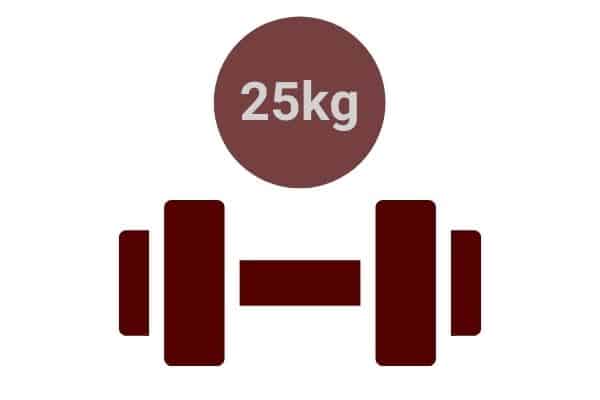
Will 25 Kg Dumbbells Be Enough To Build Muscle?
25kg dumbbells are well-priced and can be great for skinny beginners to build muscle.
25kg dumbbells will build approximately 14 pounds of muscle for a 65kg male beginner. Additionally, they can be used for up to 18 months of regular training. Therefore 25kg dumbbells offer a good balance of affordable price, longevity, and muscle-building potential.
Here’s a breakdown of the estimated longevity and expected muscle gains from 25 kg dumbbells:
| Single Dumbbell Weight | Estimated Longevity | Estimated Muscle Gains |
|---|---|---|
| 25 kg | Up to 18 months | Up to 14 pounds |
Gaining 14 pounds of muscle is a respectable achievement, and will be a highly noticeable change if you currently have a skinny body.
Your arms will look bigger, and you’ll begin to fill out your t-shirt.
However, after 18 months, you’ll probably need to upgrade to heavier dumbbells in order to continue building muscle.
Are 25 Kg Dumbbells Considered Heavy?
Depending on your current training level, the perceived weight for 25kg dumbbells will vary.
25kg dumbbells are considered to be heavy for 65kg males who have been training for less than 6 months. After approximately 15 months of training, a 65kg male will begin to find 25kg dumbbells become lighter. After 24 months of training, a 65kg male will need to upgrade 25kg dumbbells.
Here’s a breakdown of the perceived weight for 25kg dumbbells relative to your training level:
| Dumbbell Exercise | 1 Month Training | 6+ Months Training | 24+ Months Training | 5 Years Training |
|---|---|---|---|---|
| Bench Press | Heavy | Heavy | Moderate | Moderate |
| Shoulder Press | Heavy | Heavy | Heavy | Moderate |
| Dumbbell Row | Heavy | Heavy | Moderate | Moderate |
| Front Squat | Heavy | Heavy | Heavy | Moderate |
| Deadlift | Heavy | Heavy | Moderate | Light |
| Bicep Curl | Heavy | Heavy | Heavy | Heavy |
| Tricep Extension | Heavy | Heavy | Heavy | Heavy |
| Dumbbell Fly | Heavy | Heavy | Heavy | Heavy |
| Reverse Fly | Heavy | Heavy | Heavy | Heavy |
| Lateral Raise | Heavy | Heavy | Heavy | Heavy |
A 65kg male will find a pair of 25kg dumbbells sufficiently challenging for approximately 18 months of training. And this will allow him to build around 14 pounds of muscle.
However, after 18 months of using 25kg dumbbells, the individual will likely have to upgrade in order to remain challenged in the 5 core lifts.
Who Should Get 25 Kg Dumbbells?
25kg dumbbells are great for skinny guys to build muscle in the short to medium-term. They should last you approximately 1 to 2 years.
Additionally, they’re also moderately priced.
This makes them great if you’ve just started weight training, but aren’t yet committed to a long-term plan (2+ years).
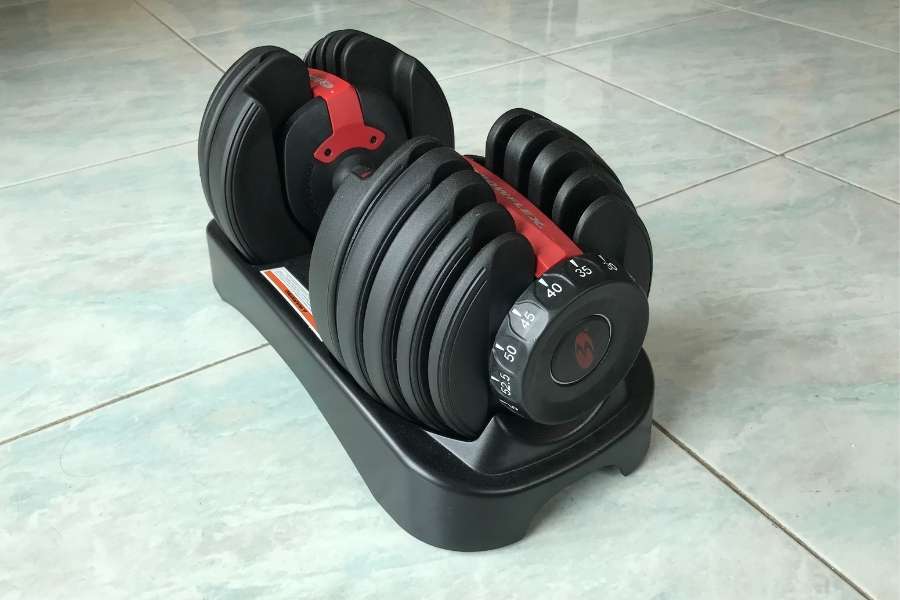
The Bowflex Selectech 552 are some of the best 25kg dumbbells out there. Having owned and tested these for 2 years, I can also say that they’re reasonably priced for what you get.
Check out my other article to find out why dumbbells are worth the money!
30/35 Kg Dumbbells.
30/35kg dumbbells can be considered medium-heavy weight. These dumbbells are where the premium models will start and will cost between £300.00 to £400.00 for a pair.
These dumbbells are commonly selectorized, but there are also some which are plate-adjustable.
They are often made from composite materials, making them very durable.
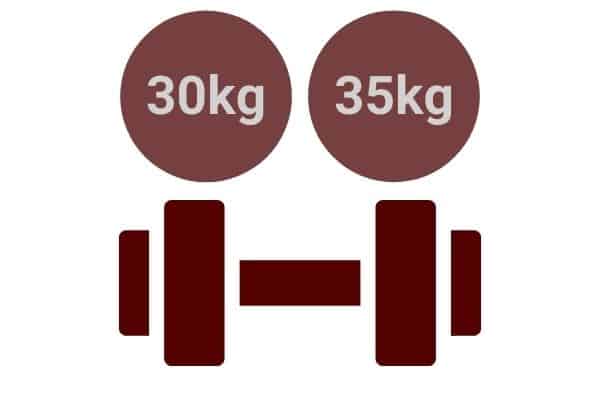
Will 30/35 Kg Dumbbells Be Enough To Build Muscle?
30/35kg dumbbells are on the upper end of the price scale, but they are good for people of all abilities to build muscle
30kg and 35kg dumbbells are effective at building over 20 pounds of muscle for a 65kg male beginner. Additionally, they can be used for more than 2 years. This makes 20 and 35kg dumbbells great for building muscle in a mid to long-term training program.
Here’s a breakdown of the estimated longevity and expected muscle gains from 20/35 kg dumbbells:
| Single Dumbbell Weight | Estimated Longevity | Estimated Muscle Gains |
|---|---|---|
| 30 kg | 24+ months | 15 to 20+ pounds |
| 35 kg | 24+ months | 20 to 25+ pounds |
Gaining over 20 pounds of muscle is a great accomplishment.
If you’re currently skinny, then gaining 20 pounds will lead to highly noticeable changes in your body. And these changes can be seen both clothed and unclothed.
You will begin to really fill out your t-shirt, and may even need to upgrade a shirt size!
Check out my other article to find out the ideal dumbbell workout duration!
Are 30/35 Kg Dumbbells Considered Heavy?
30/35kg dumbbells are on the upper scale of dumbbell weights.
30kg and 35kg dumbbells are considered to be heavy for a 65kg male who has been training for less than 24 months. After 5 years of training, a 65kg male will begin to find these dumbbells to become lighter. This makes 30kg and 35kg dumbbells great for long-term training.
Here’s a breakdown of the perceived weight for 25kg dumbbells relative to your training level:
| Dumbbell Exercise | 1 Month Training | 6+ Months Training | 24+ Months Training | 5 Years Training |
|---|---|---|---|---|
| Bench Press | Heavy | Heavy | Heavy | Moderate |
| Shoulder Press | Heavy | Heavy | Heavy | Heavy |
| Dumbbell Row | Heavy | Heavy | Heavy | Moderate |
| Front Squat | Heavy | Heavy | Heavy | Moderate |
| Deadlift | Heavy | Heavy | Heavy | Moderate |
| Bicep Curl | Heavy | Heavy | Heavy | Heavy |
| Tricep Extension | Heavy | Heavy | Heavy | Heavy |
| Dumbbell Fly | Heavy | Heavy | Heavy | Heavy |
| Reverse Fly | Heavy | Heavy | Heavy | Heavy |
| Lateral Raise | Heavy | Heavy | Heavy | Heavy |
The average 65kg male will find a pair of 30kg dumbbells to last them the majority of their lifting career. They can be used for at least 2 years of training, and allow you to build at least 20 pounds of lean muscle.
It’s only after around 3 to 5 years of regular training will you have to consider upgrading a pair of 30kg dumbbells.
| Dumbbell Exercise | 1 Month Training | 6+ Months Training | 24+ Months Training | 5 Years Training |
|---|---|---|---|---|
| Bench Press | Heavy | Heavy | Heavy | Moderate |
| Shoulder Press | Heavy | Heavy | Heavy | Heavy |
| Dumbbell Row | Heavy | Heavy | Heavy | Moderate |
| Front Squat | Heavy | Heavy | Heavy | Moderate |
| Deadlift | Heavy | Heavy | Heavy | Moderate |
| Bicep Curl | Heavy | Heavy | Heavy | Heavy |
| Tricep Extension | Heavy | Heavy | Heavy | Heavy |
| Dumbbell Fly | Heavy | Heavy | Heavy | Heavy |
| Reverse Fly | Heavy | Heavy | Heavy | Heavy |
| Lateral Raise | Heavy | Heavy | Heavy | Heavy |
35kg dumbbells will offer a similar lifespan and muscle-gain returns as a pair of 30kg dumbbells.
Just like 30kg dumbbells, it will take you around 3 to 5 years of regular training before you start to outgrow a pair of 35kg dumbbells.
In my opinion, both 30kg and 35kg dumbbells are solid options. And it won’t be a disaster if you choose 30kg’s over 35kg’s.
That being said, you should go for the 35kg’s IF your budget allows it (not a big deal if you can’t).
Who Should Get 30/35 Kg Dumbbells?
Although 30/35kg dumbbells are considered to be expensive dumbbells, they will last the average guy for the long term.
If you’re currently skinny, determined to build a powerful physique, and have the budget, you won’t be disappointed with a pair of 30/35kg dumbbells.
30/35kg dumbbells are also great if you have a higher than average bodyweight or have previously been training in the past.
If that’s the case, then you’ll probably need a higher weight compared to a skinny beginner. So I’d recommend you to pick a pair of 30/35kg’s minimum (and possibly consider getting 40/45kg dumbbells).

The Powerblock Elite with the 70lb stage 2 addon is one of the best and cheapest dumbbells in this weight category.
40/45 Kg Dumbbells
40/45kg dumbbells are considered to be heavy weights.
These are the best of the best and will cost at least £500.00 for a pair.
Modern 40/45kg adjustable dumbbells will have a selectorized mechanism, but older models may be plate-adjusted.
They are often made from high-quality composites and metal, making them extremely durable (if looked after).
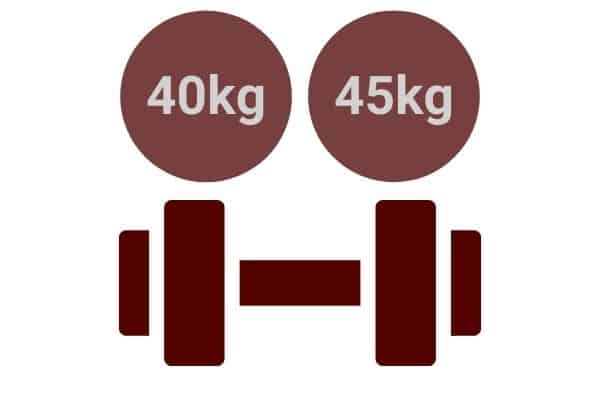
Will 40/45 Kg Dumbbells Be Enough To Build Muscle?
40/45kg dumbbells are on the highest end of the price scale, and no doubt will allow the majority of people to build muscle.
40kg and 45kg dumbbells are effective for building over 30 pounds of muscle in a 65kg male beginner. Additionally, they can be used for more than 5 years. This makes 40 and 45kg dumbbells highly suitable to build muscle for most people of all training levels.
Here’s a breakdown of the estimated longevity and expected muscle gains from 40/45 kg dumbbells:
| Single Dumbbell Weight | Estimated Longevity | Estimated Muscle Gains |
|---|---|---|
| 40 kg | 5+ Years | Up to 25 to 30+ pounds |
| 45 kg | 5+ Years | Up to 30+ pounds |
These dumbbells will help you to gain over 30 pounds of muscle, which is a highly coveted goal. And it’ll take the average person at least 1 to 2 years to reach this goal.
If you’re currently skinny, then gaining 30 pounds of muscle will cause you to become significantly larger, and you will likely have to upgrade your shirt size once and maybe twice. This is a good thing!
The changes will be highly noticeable both clothed and unclothed.
And if you can control your nutrition, you’ll have the powerful physique most men dream of having!
Check out my other article for skinny guy muscle-building tips!
Are 40/45 Kg Dumbbells Considered Heavy?
40/45kg dumbbells are on the highest scale of retail dumbbell weights.
40kg and 45kg dumbbells are considered heavy for a 65kg male who has been training for less than 5 years. Only after 5 or more years of regular training will a 65kg male begin to find these dumbbells to become lighter. Therefore these dumbbells are great for long-term training.
Here’s a breakdown of the perceived weight for 20/45kg dumbbells relative to your training level:
| Dumbbell Exercise | 1 Month Training | 6+ Months Training | 24+ Months Training | 5 Years Training |
|---|---|---|---|---|
| Bench Press | Heavy | Heavy | Heavy | Heavy |
| Shoulder Press | Heavy | Heavy | Heavy | Heavy |
| Dumbbell Row | Heavy | Heavy | Heavy | Heavy |
| Front Squat | Heavy | Heavy | Heavy | Heavy |
| Deadlift | Heavy | Heavy | Heavy | Moderate |
| Bicep Curl | Heavy | Heavy | Heavy | Heavy |
| Tricep Extension | Heavy | Heavy | Heavy | Heavy |
| Dumbbell Fly | Heavy | Heavy | Heavy | Heavy |
| Reverse Fly | Heavy | Heavy | Heavy | Heavy |
| Lateral Raise | Heavy | Heavy | Heavy | Heavy |
The average 65kg male will require many years of training before they’re able to use 40kg dumbbells consistently for most exercises.
These are extremely future-proof and will last you at least 5 years of training. Additionally, you can expect to build a minimum of 30 pounds of muscle (if you train hard enough).
Not many people will ever need to upgrade a pair of 40kg dumbbells.
| Dumbbell Exercise | 1 Month Training | 6+ Months Training | 24+ Months Training | 5 Years Training |
|---|---|---|---|---|
| Bench Press | Heavy | Heavy | Moderate | Heavy |
| Shoulder Press | Heavy | Heavy | Heavy | Heavy |
| Dumbbell Row | Heavy | Heavy | Moderate | Heavy |
| Front Squat | Heavy | Heavy | Moderate | Heavy |
| Deadlift | Heavy | Heavy | Moderate | Heavy |
| Bicep Curl | Heavy | Heavy | Heavy | Heavy |
| Tricep Extension | Heavy | Heavy | Heavy | Heavy |
| Dumbbell Fly | Heavy | Heavy | Heavy | Heavy |
| Reverse Fly | Heavy | Heavy | Heavy | Heavy |
| Lateral Raise | Heavy | Heavy | Heavy | Heavy |
Just like 40kg dumbbells, a pair of 45kg’s are extremely heavy for most people. These big boys will last you years, and allow you to pack on serious muscle mass!
Who Should Get 40/45 Kg Dumbbells?
These are heavy dumbbells!
For a 65kg skinny guy, they are a bit excessive in my opinion. A pair of 30/35kg dumbbells will do just as good a job as 40/45kg’s, and you won’t have to pay the extra premium.
Having said that, you’ll be getting a 100% future-proof pair of dumbbells with 40/45 kgs. So if your budget allows, by all means, go for it.
Besides, the extra £100 or so is well worth paying to ensure you won’t ever have to upgrade.
If you have a higher body weight (above 80kg) or have already been training for years, then you’ll want to consider getting 40/45kg’s to ensure you have room for future progression.
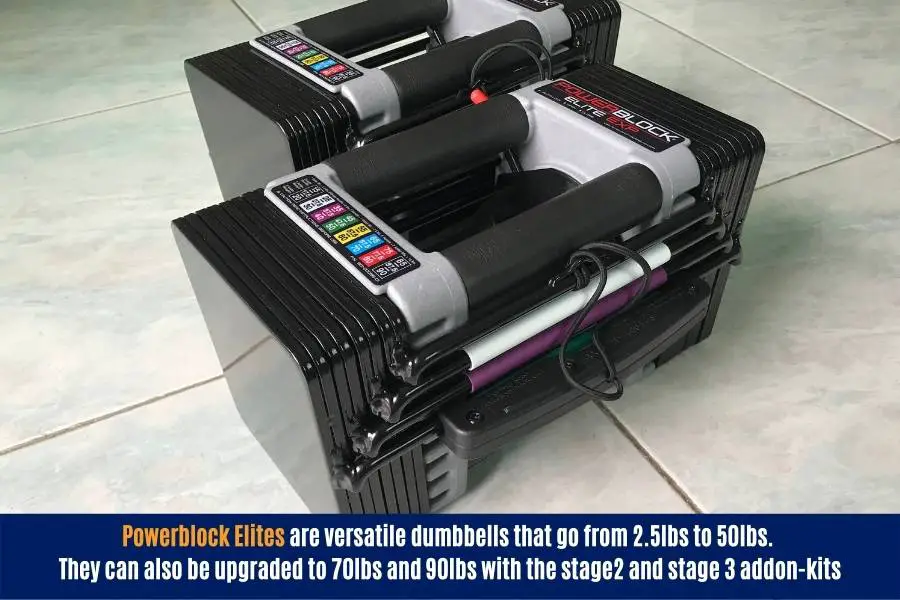
Having researched almost a dozen 90lb dumbbells, I can honestly say that the Powerblock Elite with the 90lb stage 3 addon (you can find the reviews here) is one of the most affordable dumbbells you can get at this weight.
Bear in mind, the stage 3 kit will only work if you also have the stage 2 kit.
If you’re interested, you can find my hands-on PowerBlock Elite dumbbell review here.
UPDATE: there seems to be supply issues with the Powerblock addon kits. As such, you’ll find the Bowflex 1080 dumbbells easier to order. Bowflex is just as reputable as PowerBlock!
- Includes 1-Year JRNY Membership ($149 value; auto renews when trial ends unless cancelled 48 hours prior to trial end date)
- 10 - 90 lbs per Adjustable Dumbbell
- Easy-to-Use Selection Dial
- 10, 15, 20, 25, 30, 35, 40, 45, 50, 55, 60, 65, 70, 75, 80, 85, and 90 lbs.
- Functional, full-body strength for your legs, back, chest, abs, shoulders and arms
- On-demand, full body strength classes now available on the JRNY app (JRNY Membership Required)
- Dimensions: 17.5 L x 9.5 W x 10 H each (44.4 x 24.2 x 25.3 cm)
When To Increase Dumbbell Weight.
Great, now you’ve chosen the perfect dumbbell weight. And you’re ready to start training. The good thing about adjustable dumbbells is they offer light kg’s and heavy kg’s all in one dumbbell.
As a beginner, you’ll want to start at a comfortable weight. But in order to gain muscle, you’ll have to progressively increase the dumbbell weight.
Recommended Dumbbell Progression Path.
Here’s what you need to know about the ideal dumbbell progression path.
As a general rule, the ideal dumbbell progression path involves lifting light dumbbells before heavy dumbbells. Start with a weight that you can comfortably perform for 15 repetitions. Once your strength increases, you can progress by increasing the weight by 5% to 10% and decreasing the repetitions.
As an absolute beginner, always start with a weight you are confident and comfortable handling. I’d recommend you determine the 15RM for that exercise, and take off another 2 kg per on each hand.
This allows you to benchmark your real strength standards (remember the 15RM is only an estimate).
If you find the dumbbells too light for 15 reps, then you can slowly add more weight until you’re able to perform your 15RM.
If you find the dumbbells too heavy, then reduce weight accordingly.
Start by lifting 15 reps for each exercise. Then add more weight and do a 14RM the next week, 13RM the week after, and so on until you reach 8RM.
This ensures you are safely working towards your 8RM, which is the optimal rep for muscle growth.
If you already have dumbbell lifting experience, then you can judge your 8RM accordingly.
The point is to work towards your 8RM in the safest way possible.
Applying Progressive Overload.
Once you’ve reached your 8RM, you’ll want to apply progressive overload regularly (once every one or two weeks).
Progressive overload is the practice of increasing the dumbbell workload to ensure your muscles are consistently challenged.
You can apply progressive overload by:
- Increasing weight- 10% for big multi-joint exercises and 5% for smaller single-joint exercises.
- Increasing reps- but stay within your 8RM to 15RM for optimal muscle growth.
- Increasing sets- but limit set number to 5 sets per muscle group per workout.
- Increasing training days- ideally you should hit each muscle group at least twice per week.
You may also be interested in my other article for a full guide on how and when to add weight to your dumbbells.
Dumbbell Recommendations
Here’s a recap of the recommended products mentioned in this post:
| Dumbbell | Brand | Description | Prime | Buy |
|---|---|---|---|---|
 Top
Top Top
Top | Yes4All | 10 to 20kg budget adjustable spinlock dumbbells | PrimeEligible | Check Amazon Price |
 Top
Top Top
Top | Bowflex | 25kg midrange adjustable selectorized dumbbells | PrimeEligible | Check Amazon Price |
Top Top
Top Top
Top | PowerBlock | 25kg midrange adjustable selectorized dumbbells that can be upgraded to 30 to 35kg (requires stage 2 addon kit) | PrimeEligible | Check Amazon Price |
 Top
Top Top
Top | Bowflex | 40 to 45kg premium adjustable selectorized dumbbells | PrimeEligible | Check Amazon Price |
| Weight Category | Best Option | Budget Option |
|---|---|---|
| 10-20kg | Yes4all 40lb spinlock | Yes4all dumbbells are the best budget brand. |
| 25kg | Bowflex 552 | Yes4all 50lb spinlock |
| 30-35kg | Powerblock Elite with stage 2 addon | Yes4all 60lb spinlock |
| 40-45kg | Powerblock Elite with stage 3 addon | Yes4all 100lb spinlock |
Conclusion
Today, I’ve explained what kg dumbbells you should get.
Everyone has a different strength level, and everyone requires different dumbbell weights.
I’ve taught you how to choose your ideal dumbbell weight based on your estimated strength level.
Remember, you should always get heavier dumbbells than your current needs. This redundancy will reduce the risk of having to upgrade prematurely.
I’ve also examined a range of dumbbell weights ranging from 10kg to 40kg to further help you choose the ideal dumbbell kg.
If you’re an average skinny guy (around 65kg), then I’d recommend you to get 25kg to 35kg dumbbells.
If however, you’re a higher body weight (around 80kg) or have previous training experience, then heavier 35kg to 45kg dumbbells will be more suitable.
What dumbbell kg will you be choosing?
Let me know in the comments below!
Alternatively, download the FREE Kalibre Muscle Blueprint PDF to find out EXACTLY how I transformed my skinny body as a skinny guy!
Thanks for reading guys!
Peace Out,
Kal
(Biochemistry BSc, Biomedical Sciences MSc, Ex-Skinny Guy)




